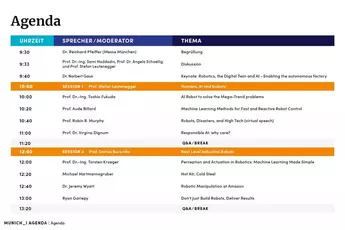Intelligence empowering tomorrow - June 28, 2023
The munich_i Hightech Summit is a top-level event in the field of AI and robotics, and will continue its success story at automatica 2023. Renowned figures from across the sector will discuss the most relevant visions, innovations, findings, and theories on the second day of the trade fair. Their intention? To consider artificial intelligence and robotics from various angles relevant to society—for a clear-sighted outlook to our future.
All bookings are made by registration with our online ticket shop—the sooner, the cheaper.
The expert panel at the munich_i Hightech Summit 2023 on June 28 is both interdisciplinary and international. Visionaries from renowned companies and with various scientific backgrounds will present and discuss the latest developments and their impact on our economy, work environments, society, and the environment.
Speaker 2023

Keynote

Session 1: Humans, AI and Robots!

Session 2: Next Level Industrial Robots

Session 3: Quality of Life

Session 4: Strategy and Business



What will be the next steps in AI and robotics development and what questions—particularly ethical ones—will such development raise? Under the theme of intelligence empowering tomorrow, the summit highlights the interaction between human and artificial intelligence, and responsible technological change. munich_i is under the auspices of the Bavarian Minister President Dr. Markus Söder who also opened the 2022 Hightech Summit in person.
The summit program includes a guided tour of the nearby AI.Society exhibition and dialog platform. This is an opportunity for you to experience first-hand how robotics and AI will be used in the fields of health, mobility, work, and environment. A concluding get-together provides perfect opportunities to discuss your take-away from the inspiring presentations and to make new contacts in an informal atmosphere.
Save the date: Wednesday, June 28, 2023, from 9:30 to 18:00.
The Munich Institute of Robotics and Machine Intelligence (MIRMI) combines the expertise of 80 professors of various disciplines at the Technical University of Munich (TUM) to conduct research into machine intelligence. A team of scientists from this group is responsible for designing the program of the munich_i Hightech Summit 2023.
Prof. Dr. Alin Albu-Schäffer (Chairman)
DLR – German Aerospace Center: Institute of Robotics and Mechatronics
Prof. Dr. phil. Klaus Bengler
Holder of the Chair of Ergonomics
Prof. Dr.-Ing. Darius Burschka
Head of the Machine Vision and Perception Group at the Chair of Robotics, Artificial Intelligence, and Real-time Systems
Prof. Dr. habil. Alois Knoll
Holder of the Chair of Robotics, Artificial Intelligence, and Real-time Systems
Prof. Dr. Edward G. Krubasik
Honorary Professor, TUM School of Management
Prof. Dr. Stefan Leutenegger
Holder of the Chair of Machine Learning for Robotics
Prof. Dr.-Ing. Markus Lienkamp
Professor at the Chair of Mobility Systems Engineering
Prof. Dr. Ruth Müller
Professorship for Science and Technology Policy
Prof. Dr. Cristina Piazza
Assistant Professor at the Chair of Computer Aided Medical Procedures
Prof. Dr. Angela Schöllig
Holder of the Chair for Safety, Performance and Reliability of Learning Systems
Prof. Dr.-Ing. Eckehard Steinbach
Holder of the Chair of Media Technology
Business leaders and scientists from Europe, North America, and Singapore discussed groundbreaking solutions and the latest research findings that will change our lives forever. Whether warehouse automation, deep learning approaches for smart robots and automated driving, or soft robotics: With its four sessions and a closing presentation, the munich_i Hightech Summit 2022 offered a wide range of topics and insights to around 200 participants from research and industry.